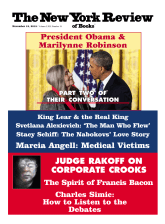In response to:
The Triumph of a Musical Adventure from the September 24, 2015 issue
To the Editors:
That Nicholas Kenyon, the director of a major orchestral venue, should leap to the defense of an orchestral training program, El Sistema, is predictable. More surprising is that such an important intellectual figure should fail to engage properly with my book El Sistema: Orchestrating Venezuela’s Youth [NYR, September 24]. He substitutes caricature for critical analysis, focusing on trivial details (e.g., Mozart in the Jungle) and disregarding serious issues (such as gender discrimination, bullying, exploitation, and allegations of sexual abuse and corruption). Instead of using his influence to push for change, he shoots the messenger and twists the message.
Beneath the media’s fantasy version lies a real Sistema, which I explore in depth; Kenyon, however, with his Hollywoodesque title, takes us back toward the shallows. He ignores rafts of evidence from musicians and scholars, relying instead on international Sistema advocates. Yet Tricia Tunstall described her book on El Sistema as “reportage, not scholarship,” designed “to proselytize on behalf of its mission.” Why does Kenyon give so much credit to boosterish opinions and so little to peer-reviewed research? One looks in vain for any scholarly foundation to his views.
Also lacking are the voices of Venezuelan musicians. Kenyon hears only the loudest opinions, those audible from his lofty London vantage point, whereas I spent more than a year in Venezuela, listening closely. He fails to understand ethnography, which analyzes the viewpoints of those at the coalface. Anonymization is not a “dubious scholarly method” but rather a standard procedure in social science and education research.
Ignoring research and recycling platitudes lead Kenyon into trouble. He believes that “only through musical agreement are the best performances realized—as anyone will testify who has witnessed musical performances where there is lack of agreement.” Yet the Simón Bolívar Orchestra, which he so loves, is a rigidly authoritarian ensemble, nicknamed the Venezuelan Slave Orchestra. Furthermore, exhaustive research by Richard Hackman found a correlation between orchestral performance quality and authoritarian leadership. Both the research and Kenyon’s own ears, then, contradict his conclusion; in fact, the sound of autocracy can be thrilling.
Kenyon recounts Alfred Brendel’s reaction to the Venezuelan Children’s Orchestra in Salzburg: “I look at the Venezuelan miracle with amazement…. Has the power of music ever generated such comprehensive social benefit?” Yet even a legendary pianist cannot assess the social benefits of music-making simply by going to a concert. Musical celebrities do not have superhuman powers of insight into complex social questions in distant parts of the world. A slick performance demonstrates intensive rehearsal, not social change.
Basic errors suggest that Kenyon failed to read the introduction. More interesting, however, is his moral stance. He does not counter the suggestion that José Antonio Abreu is ruthless, but rather argues that El Sistema’s leader was right to dismiss one of his longest-serving colleagues because he had a good replacement lined up. Like Abreu, Kenyon appears to believe that the ends justify the means.
Marshall Marcus, the director of Sistema Europe and a Kenyon ally, responded to my portrayal of El Sistema: “It may be an autocracy but it’s one that has allowed thousands of people to flourish.” But are ruthlessness and autocracy really a route to positive social change? Where are those values—teamwork, fraternity, justice—that El Sistema supposedly fosters? Or are they just empty words, employed to appeal to funders?
Geoffrey Baker
Director, Institute of Musical Research
Royal Holloway University
London, England
Nicholas Kenyon replies:
I am disappointed that Geoffrey Baker, while unsurprisingly critical of my review, does not acknowledge any of the positive points I made about his book. His reply is unwilling to admit a single positive aspect of El Sistema, ignores those areas where I do “push for change,” and instead reverts to his “scholarly” method of accusation by innuendo (“slick,” “lofty,” “celebrities”). This is a puzzling way to pursue a discussion about one of the most influential movements in music education today.
I did indeed pass over some of the more lurid accusations in his book because, as he concludes on page 229, “there is no concrete evidence that the allegations or suspicions are true.” Contrary to Baker’s reply, I do take a critical view of wholly positive assessments of El Sistema, including Tricia Tunstall’s book (see also the Times Literary Supplement, October 12, 2012), but in some respects, notably its willingness to quote founder José Antonio Abreu’s statements directly (rather than Baker’s refusal to talk to him and his reliance on unsourced gossip), Tunstall’s book is a more useful source. Baker says my views lack “scholarly foundation,” which may be the case; but I know balanced, thoughtful, informative scholarship when I read it, and I fear it is rather difficult to find this in his book.



